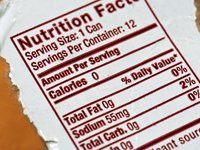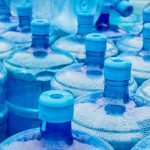“Have a Coke and a smile” was a near omnipresent slogan back in the early 1980s. But when it’s diet soda that’s being regularly consumed, a frown might be a more likely outcome than a smile. That’s because a recent study has found a link between drinking diet soda or diet fruit drinks and an increased risk of developing depression.
The research, which was conducted at the National Institutes of Health in Bethesda, Maryland, showed an association between the intake of various diet drinks and a greater likelihood of a clinical diagnosis of depression.1 Rettner, Rachael. “Drinking diet soda linked to depression.” NBC News. 8 January 2013. Accessed 16 January 2013. http://vitals.nbcnews.com/_news/2013/01/08/16417285-drinking-diet-soda-linked-to-depression?lite The participants were nearly 264,000 American adults between the age of 50 and 71. In 1995 and 1996, they completed surveys that included information on their typical beverage drinking habits, including the types of drinks they consumed and their quantities. Approximately a decade afterward, between 2004 and 2006, the researchers followed up with the subjects and questioned whether they had received a depression diagnosis since 2000.
All frequent soda drinkers–whether they preferred it with sugar or artificial sweeteners–had a higher risk of a depression diagnosis than the non-soda drinkers in the study. But, while the risk was 22 percent greater for those who drank four or more cans of regular soda per day, the diet soda dangers came in significantly higher as the number rose to 31 percent for those who drank the same amount of diet soda. The volunteers who chose at least four cans a day of diet fruit drinks faced even higher odds–they were 51 percent more likely to receive a diagnosis of depression than their peers who never consumed diet fruit drinks. Something to think about the next time you serve your kids a glass of “Light” Grape Juice with added Sucralose.
While the research was not designed to prove a cause and effect between drinking diet beverages and ending up with depression, it nevertheless showed a strong correlation. Even after the scientists factored in other possible influences that might contribute to depression, including age, gender, education attained, activity level, BMI, and whether they were smokers, the diet drink consumers had an overall higher rate of depression by a wide margin. In some cases, it is possible that other circumstances may have come into play, such as particularly stressful occurrences or a family history of depression, but it’s very unlikely that those situations would be the catalyst for a significant percentage of the subjects’ diagnoses.
And this is hardly the first time that products containing artificial sweeteners have been linked to health issues, including a higher risk of depression. Aspartame is used in many diet sodas and, in fact, these drinks account for 70 percent of the aspartame consumed.2 Mercola, Joseph. “The Deadly Neurotoxin Nearly Everyone Uses Daily.” Huffington Post. 4 August 2010. Accessed 17 January 2013. http://www.huffingtonpost.com/dr-mercola/aspartame-health-risks_b_668692.html. In addition to depression, this particular artificial sweetener has been linked to tremors, blindness, tumors, seizures, ulcers, and so much more. Aspartame is also responsible for more than 75 percent of the adverse reactions to food additives that get reported to the Food and Drug Administration.3 “Aspartame is, by Far, the Most Dangerous Substance on the Market that is Added To Foods.” Mercola. 6 November 2011. Accessed 17 January 2013. http://articles.mercola.com/sites/articles/archive/2011/11/06/aspartame-most-dangerous-substance-added-to-food.aspx Sucralose, on the other hand, has been linked to depression, anxiety, panic, thoughts of suicide or death, agoraphobia, feelings of hopelessness, and feeling alone.4 Randi Fredricks, Ph.D. “Artificial Sweeteners, Depression, and Anxiety.” RandiFredricks.com (18 Jan 2013.) http://www.randifredricks.com/randi/art/artificial.cfm
These diet soda dangers certainly make it worthwhile to consider cutting back significantly or giving up completely on artificially sweetened foods and drinks. If the current study is correct and beverages containing artificial sweeteners do increase the risk of depression, that’s just one more good reason to do so. Depression can be a very serious condition, leading to various types of substance abuse, relationship problems, employment issues, and even suicide.5 “Depression.” Mayo Clinic. 10 August 2012. Accessed 17 January 2013. http://www.mayoclinic.com/health/depression/DS00175/DSECTION=complications It may be especially problematic in aging populations such as the subjects who were involved in the recent National Institutes of Health study because depression can easily lead to isolation, health disorders, and cognitive decline.6 Duckworth, Ken. “Mental Illnesses.” National Alliance on Mental Illness. October 2009. Accessed 17 January 2013. http://www.nami.org/Template.cfm?Section=By_Illness&template=/ContentManagement/ContentDisplay.cfm&ContentID=7515
So if you are worried about your mental health status and an increased risk of depression, this one seems to be somewhat of a no-brainer. No matter how much you may enjoy your diet soda or other kinds of diet drinks, they are simply not worth the risk — and besides they actually cause you to put on weight. Switch them out for flat or sparkling water, and if you need a little more flavor, add some slices of lemon, lime, or orange. You can reduce your intake of artificial sweeteners substantially if you have been drinking several cans or glasses of diet drinks each day and take a major step toward protecting yourself from depression as well as a range of other potential health issues.
References
| ↑1 | Rettner, Rachael. “Drinking diet soda linked to depression.” NBC News. 8 January 2013. Accessed 16 January 2013. http://vitals.nbcnews.com/_news/2013/01/08/16417285-drinking-diet-soda-linked-to-depression?lite |
|---|---|
| ↑2 | Mercola, Joseph. “The Deadly Neurotoxin Nearly Everyone Uses Daily.” Huffington Post. 4 August 2010. Accessed 17 January 2013. http://www.huffingtonpost.com/dr-mercola/aspartame-health-risks_b_668692.html. |
| ↑3 | “Aspartame is, by Far, the Most Dangerous Substance on the Market that is Added To Foods.” Mercola. 6 November 2011. Accessed 17 January 2013. http://articles.mercola.com/sites/articles/archive/2011/11/06/aspartame-most-dangerous-substance-added-to-food.aspx |
| ↑4 | Randi Fredricks, Ph.D. “Artificial Sweeteners, Depression, and Anxiety.” RandiFredricks.com (18 Jan 2013.) http://www.randifredricks.com/randi/art/artificial.cfm |
| ↑5 | “Depression.” Mayo Clinic. 10 August 2012. Accessed 17 January 2013. http://www.mayoclinic.com/health/depression/DS00175/DSECTION=complications |
| ↑6 | Duckworth, Ken. “Mental Illnesses.” National Alliance on Mental Illness. October 2009. Accessed 17 January 2013. http://www.nami.org/Template.cfm?Section=By_Illness&template=/ContentManagement/ContentDisplay.cfm&ContentID=7515 |












This is a great resource,
This is a great resource, Thank you so much for doing the research.